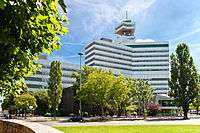Rundfunk Berlin-Brandenburg
Rundfunk Berlin-Brandenburg (RBB, stylized as rbb, German: [ˈʁʊnt.fʊŋk bɛʁˌliːn ˈbʁandn̩.bʊʁk] (![]()
 | |
| Type | Institution under public law |
|---|---|
| Country | |
| Availability | Regional National International |
| Founded | 1 May 2003 |
| Headquarters | Berlin and Potsdam |
Key people | Patricia Schlesinger |
| Affiliation | ARD |
Official website | rbb-online.de |
| Replaced | SFB and ORB |

RBB not only has two main studios in Berlin and Potsdam, but also regional studios in Cottbus and Frankfurt (Oder), and regional offices in Perleberg and Prenzlau. In addition, RBB operates the ARD International Studio in Warsaw, whose responsibility interchanges every five years between RBB and WDR (WDR was last in charge from May 2009 to September 2014).[1] The institution also operates the ARD Play-Out Center in Potsdam, a broadcast center for the programs within the ARD digital bouquet. RBB, together with WDR, is responsible for the ARD television studio in Berlin.
Legal basis
RBB was built on 25 June 2002 on the basis of the treaty about the establishment of a joint broadcasting company by the states of Berlin and Brandenburg. Therefore, RBB hosts radio and television and has to make sure that both treaty states will be equally provided "with respect to the regional program needs".
Organization and finances
Director-generals of the Rundfunk Berlin-Brandenburg (RBB)
First director-general of the RBB from 1 May 2003 to 30 June 2016 was Dagmar Reim at an annual salary of €220,000.[2] Her successor Patricia Schlesinger has been in office since 1 July 2016 and the annual salary has risen to €257,000.[3]
Finances
Every household in Germany is lawfully bound to pay a €17.50 licence fee per month as so called "Rundfunkbeitrag" (broadcast contribution) to finance the public broadcast system. [4] The fee is collected by Beitragsservice von ARD, ZDF und Deutschlandradio. RBB's revenues from the licence fee amounted to
Number of employees
In 2016 RBB had an average number of 1,938 permanent employees.[6]
Logo history
 Rundfunk Berlin-Brandenburg's first and original logo used from 1 May 2003 to 27 August 2003.
Rundfunk Berlin-Brandenburg's first and original logo used from 1 May 2003 to 27 August 2003. Rundfunk Berlin-Brandenburg's secondary logo used from 1 May 2003 to 29 February 2004.
Rundfunk Berlin-Brandenburg's secondary logo used from 1 May 2003 to 29 February 2004. Rundfunk Berlin-Brandenburg's second and previous logo used from 28 August 2003 to 27 August 2017.
Rundfunk Berlin-Brandenburg's second and previous logo used from 28 August 2003 to 27 August 2017. Rundfunk Berlin-Brandenburg's fourth and current logo as of 28 August 2017.
Rundfunk Berlin-Brandenburg's fourth and current logo as of 28 August 2017.
Program
Television
- RBB Fernsehen - Berlin and Brandenburg's regional public-broadcasting TV channel (successor to the former SFB 1 and ORB TV channels). Between 19.30 and 20.00, the channel transmits separate regional news programmes for Berlin ("Abendschau") and Brandenburg ("Brandenburg aktuell")
- Das Erste - Germany's main television network, to which RBB – as a member of ARD – contributes 7% of programming hours
- Phoenix - ARD and ZDF's joint news, events and current-affairs channel
- KI.KA - ARD and ZDF's joint children's channel
- arte - Franco-German cultural channel
- 3sat - Cultural channel provided jointly by ARD, ZDF, ORF (Austrian Broadcasting), and SRG (Swiss Broadcasting)
Radio
- Radio Berlin 88,8 - City radio for Berlin from Berlin
- Antenne Brandenburg - Public program for Brandenburg from Potsdam with regional information from the studios in Potsdam, Cottbus, Frankfurt (Oder), Perleberg and Prenzlau
- Radioeins - Radio program designed for people aged 25 and above
- Fritz - Program for young people between the age of 14 and 24
- Kulturradio - Cultural program from Berlin
- Inforadio - News program from Berlin
- Sorbischer Rundfunk - a joint program with MDR in the Sorbian language
- COSMO - wave from WDR for interested German listeners and foreigners, which is produced in cooperation with Radio Bremen and RBB, (replaced Radio Multikulti produced by RBB on 31 December 2008)
See also: German television
Well known productions
RBB is producing for ARD crime films for the crime series Tatort and Polizeiruf 110, the political journal Kontraste and the satirical show Satiregipfel (formerly "Scheibenwischer"). In the years from 2003 to 2005, RBB broadcast the Kurt Krömer Show, which attracted attention nationwide. Since 2005/06 the institution produces the successor format Bei Krömers for ARD.
The regional news show Abendschau has a high profile in the capital region. Since 1958, initially with a slot in ARD including nationwide transmission of the Berlin visit of John F. Kennedy, and later distributed under SFB-frequency, Abendschau reports as an urban magazine on politics, economy, sports and timeliness in Berlin and presents sensitivities, originals and anecdotes from the districts and boroughs.
For younger audiences between four and eight years old, RBB produces the "Ohrenbär".
References
- WDR uebergibt ARD-Berichterstattung an rbb. Westdeutscher Rundfunk. 19 September 2014. Retrieved 2 January 2015.
- Ehrenberg, Markus (12 August 2010). "220 000 Euro für RBB-Intendantin Dagmar Reim" [€220,000 for RBB's general-director Dagmar Reim]. Der Tagesspiegel (in German). Retrieved 16 April 2018.
- "So viel verdienen Deutschlands Intendanten" [This is how much Germany's TV general-directors earn]. Frankfurter Allgemeine Zeitung (in German). 27 May 2017. Retrieved 16 April 2018.
- "Archived copy". Archived from the original on 4 March 2016. Retrieved 9 March 2016.CS1 maint: archived copy as title (link)
- "Ertrags- und Aufwandsrechnung des RBB 2014" (PDF) (in German). ARD. Retrieved 15 April 2018.
- "Zahlen und Fakten 2017" (PDF) (in German). Rundfunk Berlin-Brandenburg. p. 5. Retrieved 15 April 2018.
External links
| Wikimedia Commons has media related to Rundfunk Berlin-Brandenburg. |
- rbb Homepage (in German)
